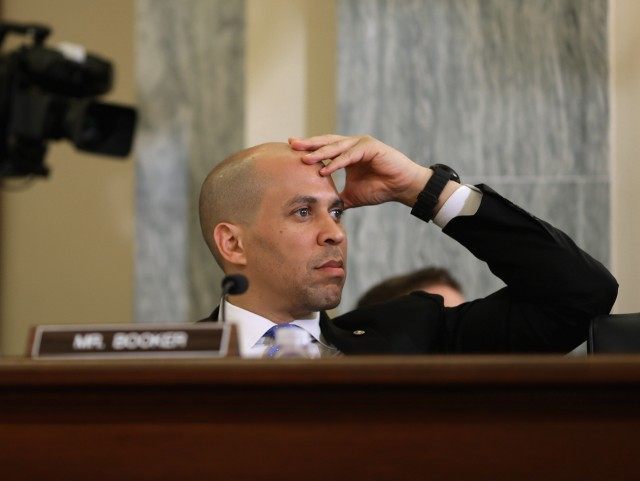Sens. Cory Booker (D-NJ) and Mark Warner (D-VA), both considered moderates, announced their support for the Iran deal Thursday.
Their decision provides President Barack Obama with an additional measure of insurance–and may allow Minority Leader Harry Reid (D-NV) to mount a filibuster against an expected Republican measure of disapproval, blocking a vote in the Senate and preventing Obama from having to exercise his veto power at all.
Booker’s support for the Iran deal is something of a surprise, as he is particularly close to Jewish groups and leaders who have opposed the deal. Rabbi Shmuley Boteach, who has known Booker since the latter’s student days as a Rhodes Scholar, had led a sustained campaign to convince his friend to oppose the deal. The other New Jersey Senator, Bob Menendez (D), announced his opposition to the Iran deal last month.
In a statement, Booker said: “Supporting the Iran deal is the better of two flawed options.” Booker also added an extensive criticism of the deal:
With this deal, we are legitimizing a vast and expanding nuclear program in Iran. We are in effect rewarding years of their deception, deceit, and wanton disregard for international law by allowing them to potentially have a domestic nuclear enrichment program at levels beyond what is necessary for a peaceful civil nuclear program.
Further, there is great uncertainty in the future. While several key forms of monitoring will continue in perpetuity, Iran’s opportunity for a nuclear breakout can conceivably become shorter than it is now and much harder to detect given the potential future size and breadth of their program. In essence, we run the risk that, after 15 years, we crowd out the opportunity for diplomacy or effective re-imposition of sanctions. If Iran’s breakout period becomes so short that the transition to a bomb is a step that would take a matter of weeks or days, we may be left with a binary choice between accepting Iran as a nuclear state or taking military action.
This deal is also troubling because after Iran meets its obligations to reduce its stockpiles, reduce their operational centrifuges, and overhaul other elements of their current nuclear program, sanctions will be lifted. It is important to note that sanctions would have been lifted with any negotiated deal, even one with the unlikely terms where Iran gave up their nuclear program entirely. With sanctions lifted, Iran will gain access to tens of billions of dollars and the means with which to greatly improve their economy through trade in the world community.
Even under sanctions and with a crippled economy, Iran had the means with which to fund and arm its destabilizing proxies in the region, support terrorism against Israel, and fund the murderous regime of Bashar Al-Assad. Now, with the deal, the Iranian economy stands to grow five percent annually, creating a potentially more reliable and steady pipeline of funding and resources for destabilizing activities and terrorism. Easing sanctions will further put our allies at risk and demand a far greater level of engagement and investment in the security of the region, particularly our critical ally Israel.
Finally, this deal includes the termination of the United Nations embargo on Iran’s conventional arms and ballistic missile technology after five and eight years, respectively. Even with increased vigilance by the United States and our allies, this will bolster Iran’s conventional weapons threats in the region.
For these reasons, rejecting this deal is a legitimate policy choice that should not be condemned or casually dismissed by those of us who support the deal.
Booker also cited the plea of a rabbi who had lost family in the Holocaust, saying that despite his vote for the deal he remained concerned about Iran’s intent and shared the goal of preventing Iran from obtaining nuclear weapons.
Warner’s own statement repeated several Obama administration talking points, such as the claim that the Iran deal “establishes a verification regime that includes continuous inspections at all of their declared nuclear sites and an enforceable mechanism to inspect any suspect undeclared sites.” Neither Warner nor Booker noted the revelation of confidential side deals between Iran and the International Atomic Energy Agency that allow Iran to inspect itself.
Neither Senator objected to the fact that the Obama administration took the Iran deal to the UN before Congress.
Update: Sen. Heidi Heitkamp (D-ND) has also announced her support for the deal.
Rabbi Boteach reacted to Sen. Booker’s announcement by reaffirming his friendship, but expressing shock at the New Jersey Senator’s reasoning: “His statement of support is riddled with logical inconsistencies, such as condemning the fact that the deal was negotiated at all–as he writes, ‘With the JCPOA [Joint Comprehensive Plan of Action], we have now passed a point of no return that we should have never reached’–and then, astonishingly, electing to embrace it.”

COMMENTS
Please let us know if you're having issues with commenting.